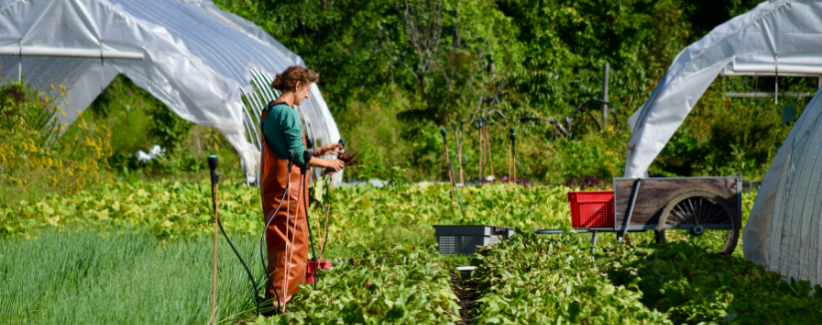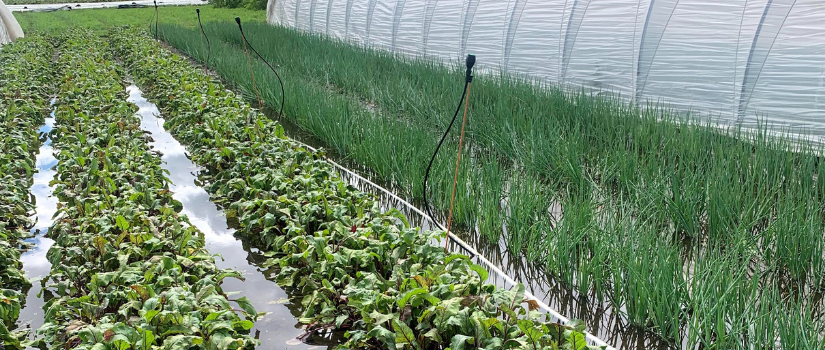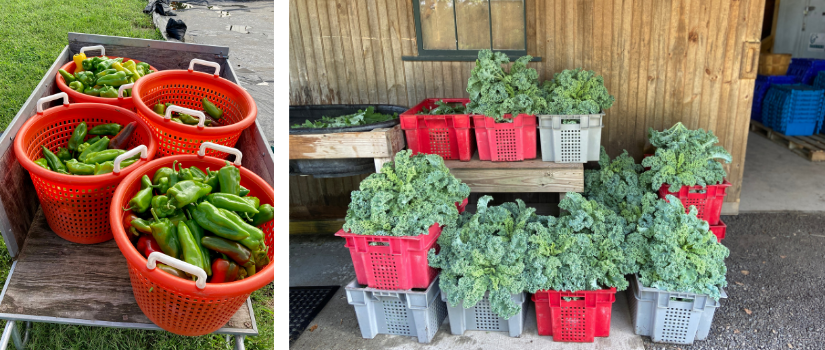Challenging Weather Can’t Dampen Gaining Ground’s Commitment to Hunger Relief

This story ran in the September 3 print edition of the Concord Journal.
CONCORD, MASS. – This summer has been a season of extremes. It was the hottest June on record for Boston and July was the wettest in Massachusetts history. These conditions have brought unprecedented pressure from diseases and pests to the fields at Gaining Ground and farms throughout the region.
Gaining Ground is a nonprofit, hunger-relief farm based in Concord that grows organic, high-quality vegetables and fruits for people who experience food insecurity and turn to the emergency food system. The farm gives away everything it grows for free to food programs in Boston, Lowell, and the MetroWest.
The unpredictable and extreme weather so far this summer has made the farm’s operations more challenging than normal. Despite this, the farm has already donated over 55,000 pounds of food this year.
“Every day, no matter the weather, our dedicated farmers and volunteers are out in the fields working to grow nutritious produce for our food insecure neighbors,” said Jennifer Johnson, Gaining Ground’s executive director. “We are grateful for their dedication and the investment our donors provide to make this work possible.”
Boston saw nine days in June where temperatures hit 90 degrees or higher and at the same time saw below average rainfall during the month. Heat stress and drought can make plants more susceptible to diseases and pests, and harm crop growth, development, and yield. All month long, the farmers provided extra irrigation to the fields to both help the crops cool themselves and prevent them from drying out. During these heat waves, plants struggle if they are unable to cool down, especially fruiting crops like tomatoes and peppers. Pollen production and viability also suffers in high heat—along with the pollinators themselves.

July then proved to be the wettest on record in Massachusetts. The statewide average rainfall was 10.30 inches in July, which is more than six inches above normal. Despite the sandy soil at the farm, the rain was heavy and consistent enough that some fields flooded. Many fungal and bacterial diseases that affect plants are spread by rain, and flourished in the cool, moist conditions that persisted all month long. Two beds of zucchini rotted in the field, but losses were felt across the farm, including crops of melons, tomatoes, summer squash, peppers, and Swiss chard.
“It’s been a really unusual and challenging season, with fluctuating temperatures and constant rains,” said Anna Kelchlin, Gaining Ground’s farm manager. “In my 10 years of farming I’ve never seen so much standing water in a field for so long—at a certain point there isn’t a whole lot you can do since the plants are essentially starved of oxygen. That’s when a farmer realizes that humans are just a tiny part of our ecosystem and that we must think forward to how we can better live in congruence with nature’s principles of keeping the soil covered with living, diverse, healthy plants.”
The diversity of crops and growing practices at the farm work to its advantage during periods of extreme weather. In a typical year, Gaining Ground raises over 50 different food crops in open fields, caterpillar tunnels, and hoop houses. Houses and tunnels extend the growing season and create protected growing environments, which ensures that even if some crops struggle under difficult weather conditions, others will still persist and even thrive. Despite the challenges, this year the farm has seen higher yields of crops like lettuce, tomatoes, and fennel than in 2020.

The weather extremes of the past months serve as a reminder that the realities of climate change have arrived. Gaining Ground’s sustainable farming practices and minimal carbon footprint not only present a model for agriculture that acts as a responsible steward to the land, but also mitigate the impacts of these difficult weather conditions.
Gaining Ground’s approach is local and sustainable—most of the farm’s produce is distributed within 20 miles of where it is grown and within 24 hours of harvest. The farm’s no-till growing methods mean that at times when other farms are unable to access their fields by tractor due to mud and flooding, Gaining Ground’s farmers can work by foot, as they normally would. Regenerative practices used by the farm—like reducing tillage, using natural mulches and cover crops, and having a diversity of plants—promote healthy soil, prevent compaction from the heavy rains, help to regulate water in the soil, and maintain a consistent supply of nutrients to crops.
Despite these adaptive practices—and the help they’ve provided—the farm couldn’t entirely mitigate the stress from the weather and extraordinary pest and disease pressure. As much as the farm works in partnership with nature, risk and uncertainty are necessary parts of the process—and what make farming such a rewarding endeavor.
Gaining Ground strives to sustainably grow as much fresh, nutrient-dense, organic produce as possible for people without enough food to eat. This means the farm operates in a way that works with nature to benefit the community and the land both today and in the years to come. Each season, nature dictates what this will look like.
For more information about Gaining Ground, email office@gainingground.org, sign up for their e-Newsletter, or visit them online at gainingground.org. Follow them on Instagram and Facebook.